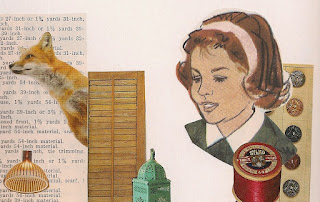91º feels like 97º ~ not yet 10:30 a.m., needless to say we've entered SCUBA weather again, meaning to breathe outside is to breathe in liquid air and to wish for a SCUBA tank and respirator ~ on the plus side, the robins have 4 chicks in the nest on our front porch and we have taken to walking the long way round the house to avoid startling the adults away from feeding the wee ones
This morning, I finally had time to read
"Why are so Many Poets also Artists?" a feature from yesterday's Literary Hub. In this interview-essay, Maggie Millner offers insight from a handful of poet-artists in their own words. As I've become more and more engrossed in collage, I am more and more interested/concerned/curious about how my visual work influences/detracts from/explodes my writing, so this gathering of voices was a must-read.
Cruising through the piece, nodding my head in affirmation, I came to
Paige Taggart's contribution. A poet and jeweler, Taggart states, "
The most practical thing is not to be an artist at all. The idea of practicality feels tied to capitalism. I don't like being practical and most practical people bore me because they make all their life decisions based on a certain set of principles that ties into 'the system.'" Then Taggart ties practicality to the patriarchy.
This brief passage brought me up short and lit a fire under all my insecurities as a poet and artist. I felt my non-hip, middle age severely, and my imposter syndrome kicked in full force.
Here is the key question:
Are being creative and being practical mutually exclusive? (And the mirrors to that question: Have I been kidding myself this whole time? Am I too practical to be an artist? Must an artist live an impractical life on the outside in order to create?)
I mean, come on. I drive a 10-year old Honda Civic that still gets 35 - 40 mpg highway and 25 - 30 mpg in town because I keep diligent track of its maintenance (and routinely do the math on gas milage).
After years of college and grad school requiring some student loans and credit card debt, I spent the first decade of my working life paying it all down to 0.
I buy basic clothes that I wear for years and years, and I don't wear make up. Some of this has to do with feminist principles (if men can succeed without being prettified, why can't I?), but mostly, I'd rather not spend time trying to figure it all out, as I'm not naturally gifted at or interested in fashion and style.
The list could go on and on, but it will always add up to this: I am a practical person. I've worn this badge with pride and connected it to my Midwestern background as the daughter of the children of farmers. I've listed "efficient," "organized," and "able to meet a deadline" as positive traits when applying for jobs. And now, I'm re-evaluating it all.
Let me say here that I'm thankful for Taggart's words for giving me a chance to look again at the idea of practicality in the artistic life. I can see why she ties this descriptor to the patriarchy and "the system," but I resist the idea that practicality must be tied to capitalism and "the man."
I confess that my practicality might hinder me from taking my wildest leaps, and that worries me greatly; however, having grown up in a working-class family of unstable finances, my relationship to financial security is probably more conservative than some (others who have grown up in this situation lean the other way...to each their own). I know that I've done my best work as a poet as I've matured financially and have been able to put "paycheck-to-paycheck" behind me. I understand that for others, living a more precarious economic life isn't as stressful, but for me that unease is a block to creativity, not a sustainer of it.
I also see a clear benefit from my practical nature when working on sending my poems out into the world. Being organized comes naturally to me and makes me happy (when I'm most stressed I love to clean my file cabinet drawers and send loads of paper through the shredder to recycling). This skill set has helped me keep track of submissions and publications, and I think it helps me persevere after rejection as well.
In the end, I am probably a person who would bore Taggart; however, I'll make a claim here that my practical nature serves my art. I'm not going to be the one to downsize and put all my belongings in storage so I can go on a life-changing trek; I'm not going to be the one to leave my academic job and open a bookstore/art space; I'm not going to be the one to take the massive, visible leap. But, I'll feel secure enough physically and mentally to take those risks on the page.
Still, I'll keep Taggart's words in mind when my inner-voice reaches too quickly for practicality, especially during the great incubation period of inspiration.


